| Listing 1 - 9 of 9 |
Sort by
|
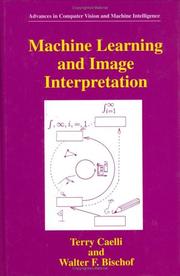
ISBN: 9780306457616 030645761X Year: 1997 Publisher: New York, N.Y.: Plenum,
Abstract | Keywords | Export | Availability | Bookmark
 Loading...
Loading...Choose an application
- Reference Manager
- EndNote
- RefWorks (Direct export to RefWorks)
Image processing --- Optical pattern recognition --- Machine learning
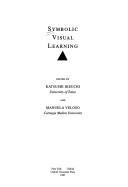
ISBN: 9780195098709 0195098706 Year: 1997 Publisher: New York, N.Y.: Oxford university press,
Abstract | Keywords | Export | Availability | Bookmark
 Loading...
Loading...Choose an application
- Reference Manager
- EndNote
- RefWorks (Direct export to RefWorks)
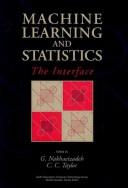
ISBN: 0471148903 Year: 1997 Publisher: New York (N.Y.) : Wiley,
Abstract | Keywords | Export | Availability | Bookmark
 Loading...
Loading...Choose an application
- Reference Manager
- EndNote
- RefWorks (Direct export to RefWorks)
Mathematical statistics --- Machine learning --- Data processing --- Congresses.
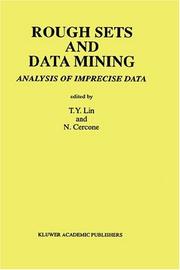
ISBN: 0792398076 9780792398073 Year: 1997 Publisher: [Boston]: Kluwer Academic Publishers,
Abstract | Keywords | Export | Availability | Bookmark
 Loading...
Loading...Choose an application
- Reference Manager
- EndNote
- RefWorks (Direct export to RefWorks)
Database management --- Database searching --- Rough sets --- Machine Learning
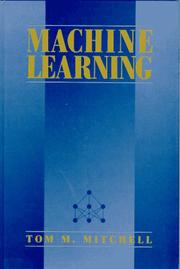
ISBN: 0070428077 9780070428072 0071154671 9780071154673 Year: 1997 Publisher: Boston McGraw-Hill
Abstract | Keywords | Export | Availability | Bookmark
 Loading...
Loading...Choose an application
- Reference Manager
- EndNote
- RefWorks (Direct export to RefWorks)
Artificial intelligence. Robotics. Simulation. Graphics --- Machine Learning --- Computer algorithms --- 681.3*I26 --- 681.3*K32 --- Learning: analogies; concept learning; induction; knowledge acquisition; language acquisition; parameter learning (Artificial intelligence)--See also {681.3*K32} --- Computer and information science education: curriculum; self-assessment --- Basic Sciences. Statistics --- Statistics (General) --- Computer algorithms. --- Machine learning. --- Artificiële intelligentie --- Computeralgoritmen --- Machineleren --- 681.3*I26 Learning: analogies; concept learning; induction; knowledge acquisition; language acquisition; parameter learning (Artificial intelligence)--See also {681.3*K32} --- 681.3*K32 Computer and information science education: curriculum; self-assessment --- Statistics (General). --- Artificiële intelligentie. --- Computeralgoritmen. --- Machineleren. --- Machine learning --- Learning, Machine --- Artificial intelligence --- Machine theory --- Algorithms --- Algorithmes --- Apprentissage automatique
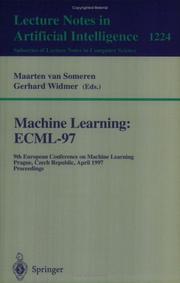
ISBN: 3540628584 3540687084 9783540628583 Year: 1997 Volume: 1224 Publisher: Berlin: Springer,
Abstract | Keywords | Export | Availability | Bookmark
 Loading...
Loading...Choose an application
- Reference Manager
- EndNote
- RefWorks (Direct export to RefWorks)
This book constitutes the refereed proceedings of the Ninth European Conference on Machine Learning, ECML-97, held in Prague, Czech Republic, in April 1997. This volume presents 26 revised full papers selected from a total of 73 submissions. Also included are an abstract and two papers corresponding to the invited talks as well as descriptions from four satellite workshops. The volume covers the whole spectrum of current machine learning issues.
Machine learning --- Congresses. --- Computer Science --- Engineering & Applied Sciences --- Congresses --- Computer science. --- Algorithms. --- Artificial intelligence. --- Computer Science. --- Artificial Intelligence (incl. Robotics). --- Algorithm Analysis and Problem Complexity. --- AI (Artificial intelligence) --- Artificial thinking --- Electronic brains --- Intellectronics --- Intelligence, Artificial --- Intelligent machines --- Machine intelligence --- Thinking, Artificial --- Bionics --- Cognitive science --- Digital computer simulation --- Electronic data processing --- Logic machines --- Machine theory --- Self-organizing systems --- Simulation methods --- Fifth generation computers --- Neural computers --- Algorism --- Algebra --- Arithmetic --- Informatics --- Science --- Foundations --- Computer software. --- Artificial Intelligence. --- Software, Computer --- Computer systems --- Machine learning - Congresses
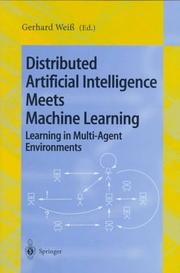
ISBN: 3540629343 3540690506 9783540629344 Year: 1997 Volume: 1221 1221 Publisher: Berlin, Heidelberg : Springer Berlin Heidelberg : Imprint: Springer,
Abstract | Keywords | Export | Availability | Bookmark
 Loading...
Loading...Choose an application
- Reference Manager
- EndNote
- RefWorks (Direct export to RefWorks)
The complexity of systems studied in distributed artificial intelligence (DAI), such as multi-agent systems, often makes it extremely difficult or even impossible to correctly and completely specify their behavioral repertoires and dynamics. There is broad agreement that such systems should be equipped with the ability to learn in order to improve their future performance autonomously. The interdisciplinary cooperation of researchers from DAI and machine learning (ML) has established a new and very active area of research and development enjoying steadily increasing attention from both communities. This state-of-the-art report documents current and ongoing developments in the area of learning in DAI systems. It is indispensable reading for anybody active in the area and will serve as a valuable source of information.
Machine learning --- Distributed artificial intelligence --- Computer Science --- Engineering & Applied Sciences --- 681.3*I2 <063> --- Learning, Machine --- Artificial intelligence --- Machine theory --- DAI (Artificial intelligence) --- Distributed AI (Artificial intelligence) --- Artificial intelligence. AI--Congressen --- 681.3*I2 <063> Artificial intelligence. AI--Congressen --- Computer science. --- Programming languages (Electronic computers). --- Artificial intelligence. --- Computer simulation. --- Computer Science. --- Artificial Intelligence (incl. Robotics). --- Simulation and Modeling. --- Programming Languages, Compilers, Interpreters. --- Computer modeling --- Computer models --- Modeling, Computer --- Models, Computer --- Simulation, Computer --- Electromechanical analogies --- Mathematical models --- Simulation methods --- Model-integrated computing --- AI (Artificial intelligence) --- Artificial thinking --- Electronic brains --- Intellectronics --- Intelligence, Artificial --- Intelligent machines --- Machine intelligence --- Thinking, Artificial --- Bionics --- Cognitive science --- Digital computer simulation --- Electronic data processing --- Logic machines --- Self-organizing systems --- Fifth generation computers --- Neural computers --- Computer languages --- Computer program languages --- Computer programming languages --- Machine language --- Languages, Artificial --- Informatics --- Science --- Congresses --- Artificial Intelligence. --- Machine learning - Congresses --- Distributed artificial intelligence - Congresses --- Programming languages (Electronic computers)
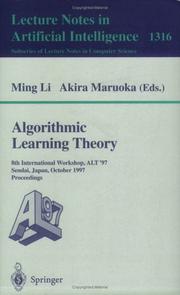
ISBN: 3540635777 3540696024 Year: 1997 Volume: 1316 Publisher: Berlin ; Heidelberg ; New York Springer Verlag
Abstract | Keywords | Export | Availability | Bookmark
 Loading...
Loading...Choose an application
- Reference Manager
- EndNote
- RefWorks (Direct export to RefWorks)
This book constitutes the refereed proceedings of the 8th International Workshop on Algorithmic Learning Theory, ALT'97, held in Sendai, Japan, in October 1997. The volume presents 26 revised full papers selected from 42 submissions. Also included are three invited papers by leading researchers. Among the topics addressed are PAC learning, learning algorithms, inductive learning, inductive inference, learning from examples, game-theoretical aspects, decision procedures, language learning, neural algorithms, and various other aspects of computational learning theory.
Computer algorithms --- Machine learning --- Congresses --- Computer Science --- Engineering & Applied Sciences --- Computer science. --- Mathematical logic. --- Artificial intelligence. --- Computer Science. --- Artificial Intelligence (incl. Robotics). --- Mathematical Logic and Formal Languages. --- Artificial Intelligence. --- AI (Artificial intelligence) --- Artificial thinking --- Electronic brains --- Intellectronics --- Intelligence, Artificial --- Intelligent machines --- Machine intelligence --- Thinking, Artificial --- Bionics --- Cognitive science --- Digital computer simulation --- Electronic data processing --- Logic machines --- Machine theory --- Self-organizing systems --- Simulation methods --- Fifth generation computers --- Neural computers --- Informatics --- Science --- Algebra of logic --- Logic, Universal --- Mathematical logic --- Symbolic and mathematical logic --- Symbolic logic --- Mathematics --- Algebra, Abstract --- Metamathematics --- Set theory --- Syllogism --- Logic, Symbolic and mathematical.
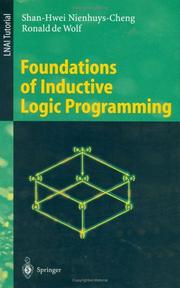
ISBN: 3540629270 3540690492 9783540629276 Year: 1997 Volume: 1228 Publisher: Berlin, Heidelberg : Springer Berlin Heidelberg : Imprint: Springer,
Abstract | Keywords | Export | Availability | Bookmark
 Loading...
Loading...Choose an application
- Reference Manager
- EndNote
- RefWorks (Direct export to RefWorks)
Inductive Logic Programming is a young and rapidly growing field combining machine learning and logic programming. This self-contained tutorial is the first theoretical introduction to ILP; it provides the reader with a rigorous and sufficiently broad basis for future research in the area. In the first part, a thorough treatment of first-order logic, resolution-based theorem proving, and logic programming is given. The second part introduces the main concepts of ILP and systematically develops the most important results on model inference, inverse resolution, unfolding, refinement operators, least generalizations, and ways to deal with background knowledge. Furthermore, the authors give an overview of PAC learning results in ILP and of some of the most relevant implemented systems.
Mathematical logic --- Theory of knowledge --- Logic programming --- Logisch programmeren --- Logische programmering --- Programmation logique --- Programmeren [Logisch ] --- Programming [Logic ] --- Logic programming. --- Machine learning. --- Induction (Logic) --- Machine learning --- Computer Science --- Engineering & Applied Sciences --- 681.3*D16 --- 681.3*F41 --- 681.3*I26 --- Learning, Machine --- Artificial intelligence --- Machine theory --- Computer programming --- Inductive logic --- Logic, Inductive --- Logic --- Reasoning --- Computerwetenschap--?*D16 --- Mathematical logic: computability theory; computational logic; lambda calculus; logic programming; mechanical theorem proving; model theory; proof theory;recursive function theory--See also {681.3*F11}; {681.3*I22}; {681.3*I23} --- Learning: analogies; concept learning; induction; knowledge acquisition; language acquisition; parameter learning (Artificial intelligence)--See also {681.3*K32} --- 681.3*I26 Learning: analogies; concept learning; induction; knowledge acquisition; language acquisition; parameter learning (Artificial intelligence)--See also {681.3*K32} --- 681.3*F41 Mathematical logic: computability theory; computational logic; lambda calculus; logic programming; mechanical theorem proving; model theory; proof theory;recursive function theory--See also {681.3*F11}; {681.3*I22}; {681.3*I23} --- Computer science. --- Software engineering. --- Computer programming. --- Mathematical logic. --- Artificial intelligence. --- Computer Science. --- Software Engineering/Programming and Operating Systems. --- Artificial Intelligence (incl. Robotics). --- Mathematical Logic and Formal Languages. --- Programming Techniques. --- AI (Artificial intelligence) --- Artificial thinking --- Electronic brains --- Intellectronics --- Intelligence, Artificial --- Intelligent machines --- Machine intelligence --- Thinking, Artificial --- Bionics --- Cognitive science --- Digital computer simulation --- Electronic data processing --- Logic machines --- Self-organizing systems --- Simulation methods --- Fifth generation computers --- Neural computers --- Algebra of logic --- Logic, Universal --- Symbolic and mathematical logic --- Symbolic logic --- Mathematics --- Algebra, Abstract --- Metamathematics --- Set theory --- Syllogism --- Computers --- Electronic computer programming --- Electronic digital computers --- Programming (Electronic computers) --- Coding theory --- Computer software engineering --- Engineering --- Informatics --- Science --- Programming --- Artificial Intelligence. --- Logic, Symbolic and mathematical.
| Listing 1 - 9 of 9 |
Sort by
|

 Search
Search Feedback
Feedback About UniCat
About UniCat  Help
Help News
News